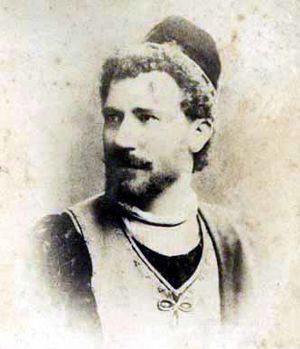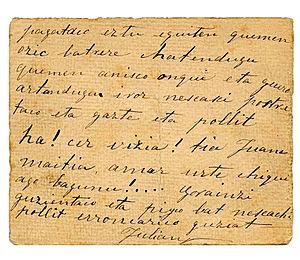Julián Gayarre facts for kids
Quick facts for kids
Julián Gayarre
|
|
|---|---|

Gayarre circa 1870
|
|
| Born |
Sebastián Julián Gayarre Garjón
9 January 1844 |
| Died | 2 January 1890 (aged 45) Madrid, Spain
|
Julián Gayarre (born Sebastián Julián Gayarre Garjón, January 9, 1844 – January 2, 1890) was a very famous Spanish opera singer. He was known as a tenor, which is a male singer with a high voice. Many people in the late 1800s thought he was the best tenor of his time.
Gayarre became famous for singing important roles in operas. These included Marcello in Il Duca d'Alba and Enzo in La Gioconda.
Contents
Julián Gayarre's Life Story
Julián Gayarre grew up in a small town called Roncal in the Pyrenees mountains of Spain. His family was not rich. He was the third child of Mariano Gayarre and Maria Ramona Garjón.
Early Life and Music
Julián left school when he was 13 to work as a shepherd. At 15, he moved to Pamplona to work in a shop. This is where he first discovered his love for music. He even lost his job because he left the shop to follow a band playing in the street!
After that, he worked as a blacksmith. A co-worker heard him singing and encouraged him to join a local choir called the Orfeón Pamplonés. The choir's director, Joaquin Maya, was impressed. He introduced Julián to a famous music teacher, Hilarión Eslava.
Eslava noticed Julián's beautiful voice, even though it was not yet trained. He helped Julián get a scholarship to study at the Madrid Royal Conservatory. Julián first performed in public in 1867. He used the stage name "Sandoval" with a zarzuela company in Tudela. A zarzuela is a Spanish musical play.
Becoming an Opera Star
After studying, Julián sang in choirs in Madrid. But he was fired by a theater manager and went back home with no money. His friends and teachers believed in him. They helped him get money to study more in Milan, Italy.
In 1869, Julián Gayarre made his first opera performance in Italy. He sang the role of Nemorino in L'elisir d'amore. He quickly became known for his amazing voice and stage presence. Critics in Italy especially loved his acting.
His early fame came from performing in big opera houses in Italy. He created new roles in important operas like Il Duca d'Alba in 1871 and La Gioconda in 1876. Soon, everyone wanted him to sing in Paris, London, and his home country, Spain. He also sang in many other cities, including Lisbon, Vienna, and Saint Petersburg. He even toured in Brazil and Argentina.
Famous Performances
Julián Gayarre sang in many different types of operas. He performed in works by famous composers like Giuseppe Verdi and Richard Wagner. In 1872, he sang in the first Italian performance of Wagner's Tannhäuser. He also sang in the first performance of Wagner's Lohengrin in Madrid in 1881.
He was also known for singing in French operas. These included Faust by Charles Gounod and several operas by Giacomo Meyerbeer.
Later Years and Legacy
Julián Gayarre's best years were from 1873 to 1886. After that, he started having breathing problems, and his voice became weaker. His last performance was on December 8, 1889, in Madrid. He was singing in Les pêcheurs de perles by Georges Bizet. During the show, his voice cracked. He reportedly said, "I cannot sing anymore." He died just 25 days later, at the age of 45. He was buried in his hometown of Roncal.
In 1901, a beautiful marble and bronze monument was placed on his grave. Two years later, the main theater in Pamplona was renamed in his honor. There is also a singing competition for young singers named after him.
Julián Gayarre's letters to his family are very important. They were written in the Basque dialect of Roncal, which is now no longer spoken. These letters help experts understand the old language.
Julián Gayarre's Voice
Julián Gayarre died before sound recording technology was common. So, we don't have any recordings of his voice. What we know comes from people who heard him sing.
One critic said that Gayarre's voice was "full, resonant and extraordinarily fascinating." He was praised for his breath control and clear singing. He could also change his voice from soft to strong in amazing ways. Another critic wrote that he was "a tenor who sings. We were no longer accustomed to it."
Films About Julián Gayarre
Several Spanish films have been made about Julián Gayarre's life. These include:
- El Canto del ruiseñor (1932)
- Gayarre (1959), starring famous tenor Alfredo Kraus
- Romanza Final (1986), starring another famous tenor, José Carreras
These films often add fictional parts to his true story.
Images for kids
See also
 In Spanish: Julián Gayarre para niños
In Spanish: Julián Gayarre para niños
 | Misty Copeland |
 | Raven Wilkinson |
 | Debra Austin |
 | Aesha Ash |



